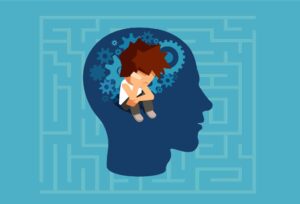Attention Deficit Hyperactivity Disorder (ADHD) is a condition that affects many people around the world. Symptoms can include difficulty paying attention, hyperactivity, and impulsiveness. While there is no cure for ADHD, there are treatments that can help manage the symptoms. Some people choose to take prescription medications, while others may choose to try alternative treatments such as vitamins and supplements. In this blog post, we will discuss whether or not vitamins can help treat ADHD symptoms.
Contents
What Is ADHD?

ADHD is a mental disorder that most commonly affects children. According to the Centers for Disease Control and Prevention (CDC), about 11% of children in the United States have ADHD.
ADHD can be a difficult condition to live with. There is no single cause of ADHD. Rather, it is caused by a combination of genetic and environmental factors. Some research suggests that certain vitamins and minerals may play a role in the development of ADHD.
For example, one study found that children with ADHD were more likely to have lower levels of zinc and iron than children without ADHD. Another study found that taking a daily multivitamin/mineral supplement improved symptoms in adults with ADHD.
While vitamin and mineral deficiencies can contribute to the development of ADHD, taking supplements is not a cure for the condition. But it can be cured if your ADHD is caused by a deficiency of vitamins.
Is ADHD A Vitamin Deficiency?
ADHD is a Vitamin deficiency, that’s what some people think. They say that vitamins can help improve symptoms of ADHD. But is there any evidence to support this claim?
There are a few small studies that suggest that certain vitamins may help with ADHD symptoms. For example, one study found that children with ADHD who took a vitamin B-12 supplement had improvements in their symptoms.
However, it’s important to keep in mind that these studies are small and more research is needed to confirm the findings. Additionally, vitamins are not a complete cure for ADHD.
If you’re considering using vitamins to treat your child’s ADHD, it’s important to speak with a doctor first. They can help you understand the risks and benefits of this approach and make sure that your child is getting the nutrients they need.
If you’re considering using vitamins to treat your child’s ADHD, speak with a doctor first to understand the risks and benefits and a replacement for evidence-based treatments such as medication and behavioral therapy.
What Vitamins Can Help With ADHD?
Vitamins that can help to treat ADHD are as follows:
- Vitamin D: Vitamin D helps the body to absorb calcium which is necessary for proper nerve and muscle function. It is found in fortified milk, cheese, and some fish.
- Vitamin B-12: This vitamin is essential for proper brain function and development. It is found in meat, poultry, eggs, and dairy products
- Omega-three fatty acids: These are essential for brain development and function. Studies have shown that people with ADHD tend to have lower levels of omega-three fatty acids. It is found in fish, such as salmon, tuna, and sardines. It is also found in flaxseed, canola oil, and walnuts.
- Iron: Iron is necessary for proper brain development and functioning. An iron deficiency has been linked to ADHD. It is found in meat, poultry, seafood, beans, lentils,
- Multivitamins: A multivitamin can help to provide the body with all the essential vitamins and minerals. This can help to improve symptoms of ADHD. It is present in many foods, such as fruits, vegetables, whole grains, and fortified cereals.
- Vitamin B: This vitamin is essential for a healthy nervous system. It can help to improve focus and concentration. Includes meat, poultry, fish, eggs, dairy products, and fortified cereals.
- Vitamin C: This vitamin is important for a healthy immune system. It can help to reduce stress and anxiety levels. It includes citrus fruits, tomatoes, potatoes, broccoli, and Brussels sprouts.
- Zinc: It is also helpful in maintaining a healthy immune system like vitamin C. It can help to improve symptoms of ADHD. It is present in meat, poultry, seafood, beans, and nuts.
- Magnesium: This mineral is important for a healthy nervous system. It can help to improve symptoms of ADHD. It is available in green leafy vegetables, whole grains, nuts, and seeds.
While vitamins can help to improve symptoms of ADHD, it is important to remember that they are not a cure. If you think you or your child may have ADHD, please speak to a doctor. They should not be used as a replacement for medical advice.
How Vitamins For ADHD Works?

Vitamin for ADHD works by correcting the nutrient deficiencies that are present in people with ADHD. Doing so can help to improve focus, attention, and concentration. Additionally, it can also help to reduce hyperactivity and impulsivity.
For example, Vitamin B-12 helps the body to make red blood cells and keep the nervous system functioning properly. A deficiency in vitamin B-12 can cause fatigue, weakness, and memory problems.
Vitamins work by improving the symptoms of ADHD by:
- Regulating the production of neurotransmitters: Neurotransmitters are chemicals that help to transmit signals between nerve cells in the brain.
- Improving blood circulation: People with ADHD often have poor blood circulation. This can lead to a lack of oxygen and nutrients getting to the brain.
- Supporting cognitive function: Vitamins can help to improve cognitive function by providing the nutrients that are necessary for the brain to function properly.
Vitamins B, C, and D are essential for maintaining healthy levels of dopamine and norepinephrine, which are two important neurotransmitters that are linked to ADHD. Deficiencies in these vitamins have been linked to ADHD symptoms such as impulsivity, hyperactivity, and difficulty concentrating.
Iron is a mineral that is necessary for the production of dopamine and norepinephrine. It is also necessary for proper blood circulation.
While there is no one specific vitamin that can help to treat ADHD, a lack of certain vitamins has been linked with symptoms associated with the disorder. For example, vitamin D helps the body to absorb calcium, which is necessary for proper nerve and muscle function. A deficiency in vitamin D has been linked to ADHD. Omega-three fatty acids are essential for brain development and function, and studies have shown that people with ADHD tend to have lower levels of these important nutrients.
Can Vitamins Help Treat ADHD?
There’s no one-size-fits-all answer to this question, as the best course of treatment for ADHD may vary from person to person. However, some research has suggested that certain vitamins and minerals may help to improve symptoms of ADHD in some people.
For instance, one study found that children with ADHD who took a daily multivitamin showed improvement in symptoms such as hyperactivity and impulsivity. Another study found that taking iron supplements may help to improve ADHD symptoms in some children.
There is no scientific evidence to support the claim that vitamins can help people with ADHD. However, some people believe that certain vitamins and supplements may be beneficial.
Of course, it’s important to speak with a doctor before starting any new supplement regimen, as vitamins and minerals can interact with other medications. And while vitamins may help to improve symptoms in some people with ADHD, they are not a cure for the condition.
If you’re concerned about your child’s symptoms, be sure to speak with a doctor or other mental health professional.
What Are The Alternatives to Treat ADHD?

There are various alternatives to treating ADHD with medication. These include:
- Psychotherapy: ADHD learns how to control their impulsive behavior and improve their ability to concentrate.
- Behavioral therapy: This type of therapy helps people with ADHD change their behavior.
- Parent training and education: This can help parents better understand and deal with their child’s ADHD.
- Dietary changes: Some people believe that certain foods can trigger or worsen ADHD symptoms. Eliminating these foods from your child’s diet may help improve their symptoms.
- Exercise: Some research has shown that regular exercise can help improve ADHD symptoms. Exercise can also help improve overall health and well-being.
- Stress management: Managing stress and anxiety can be helpful for people with ADHD. This may involve relaxation techniques, such as yoga or meditation.
- Organizational skills training: This can help people with ADHD learn how to better organize their lives and manage their time.
- Biofeedback: It is a technique that uses sensors to feedback information about the body to the brain. This information can help people with ADHD learn to control their symptoms.
- Neurofeedback: This is a type of biofeedback that uses brain waves to feedback information to the brain. This information can help people with ADHD learn to control their symptoms.
- Cognitive training: It can help people with ADHD improve their cognitive skills, such as memory and attention span.
- Social skills training: This can help people with ADHD learn how to better interact with others.
- Anger management: It can help people with ADHD deal with their anger in a healthy way.
- Occupational therapy: This can help people with ADHD learn new skills and find ways to make daily tasks easier.
- Speech therapy: This can help people with ADHD improve their communication skills.
- Support groups: It can provide people with ADHD and their families with support and information.
Medication is often the first line of treatment, but there are many non-medication options available. Talk to your doctor about what might be the best option for you or your child. However, there is no scientific evidence to support this claim. Thus these are some alternative treatments for ADHD.
Conclusion
In conclusion, vitamins may help some children with ADHD, but there is no scientific evidence to support this claim. It can’t hurt to try them, but don’t expect miracles. If your child is taking vitamins and still having symptoms, talk to their doctor about other treatment options.
Vitamins are not a cure for ADHD, but they can be one tool in managing the condition. If you decide to try them, make sure you’re getting high-quality vitamins from a reputable source. And as always, talk to your child’s doctor before starting any new treatment.
For further information and suggestions, please contact Therapy Mantra. We have a team of expert therapists that can help you overcome this problem. Get in touch with us right away to learn more about our services. You may also make an online therapy session or download our free Android or iOS app.


